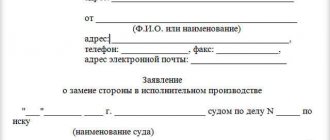By law, the alimony payer is required to pay a certain amount of money from his monthly income. However, when a job changes, some problems may arise due to failure to notify all concerned in a timely manner. In this case, the question arises: when changing jobs, what to do with alimony?
Are funds paid when changing jobs?
When changing jobs, the financial situation of the payer worsens. If he quickly finds a new place, then the changes are not noticeable. But if it is not possible to find a new place for a long time, then financial problems arise for both parties. How money will be paid for the maintenance of minors during this period, the parties can determine independently by concluding an additional agreement.
If, after termination of the employment contract, the father finds a job, then there is no need to conclude an agreement; he can continue to act independently. You just need to discuss this with the recipient, and the oral transaction should be recorded on video.
If there is a possibility that the period of unemployment will be long, then the payer needs to carefully prepare. The father and his employer must do everything to ensure that funds for the provision of children are received uninterruptedly, at least the minimum must be received every month. Indeed, for late payments, these persons may be brought to civil, administrative and criminal liability.
What should a child support recipient do?
When wondering how to properly arrange alimony, the recipient must understand that many problems in the future will fall on the shoulders of bailiffs. In particular, when the payer changes jobs, it is they who will control the re-registration of alimony payments. Therefore, often the claimant does not need to do anything.
But if the bailiffs did not fulfill their functions and payments stopped, you need to:
- File a complaint about their inaction;
- Try to find a new place of work for the payer yourself;
- Achieve restrictions on the debtor's rights (deprive parental rights, prohibit travel abroad, arrest or confiscate property).
In some cases, this will require going to court.
If automatic re-registration of alimony between the accounting departments of the debtor’s previous and new places of work has not occurred, then it is necessary to open enforcement proceedings. This is done by bailiffs at the request of the claimant.
Actions of the alimony worker and the company accountant
The child support provider is obliged to notify the child’s mother and the bailiff that he has changed his address or source of income. If a parent agrees to pay voluntarily, then he must write 2 statements:
- to the former employer, demanding to stop withholding;
- getting a job in a new company, with a request for the transfer of collected alimony.
What should the responsible employee do when re-registering an employee:
- Send notice of dismissal to the recipient of the money if payments are made by agreement or by the bailiff, if by writ of execution. This is stated in Article 111 of the RF IC. The notice must be sent within 3 days of termination of the contract.
- If the name of the company where the person got a job is known, then the accounting department should also provide information to the child’s mother and the bailiff.
- Send the documents on the basis of which the collections were made to the recipient of the funds. The deadline and procedure for sending enforcement documents are specified in paragraph 4.1 of Article 98 of the Federal Law “On Enforcement Proceedings”. The deadlines are calculated from the day the order to terminate the contract is issued.
An employee of the organization must send documents by registered mail with notification. In case of non-receipt or loss, the employer will be able to prove that this was not his fault and he completed everything on time.
Responsibilities of the employer to re-register alimony
The previous employer of the alimony payer must also take certain actions.
First, within three days he informs the bailiff and the recipient of the money about the dismissal of the alimony worker and his employment in another company/enterprise. If it is known where exactly he is employed, this information is also included in the written notice.
Secondly, the employer sends to the bailiff all documents related to the issue of alimony (primarily the writ of execution) so that the execution of the judicial act continues without complications.
Actions of the bailiff
When a person moves from one company to another, the bailiff must take measures to ensure that transfers are made without interruption. To do this, he must, immediately after the executor receives the worksheet, send it to the new employer with a resolution to foreclose on the citizen’s income. At the same time, he is obliged to monitor the process of transfer and receipt of papers, as well as the fulfillment of requirements by third parties.
What to do with the writ of execution?
According to the general rule, when dismissing an alimony payer, the employer must inform the bailiff service about this within three days and return them the writ of execution with the appropriate note about the transfers made.
The mark must contain the following information:
- the total amount of alimony penalties;
- the amount that was withheld at the time of the payer’s dismissal;
- payment document number (order, receipt);
- the remaining amount of alimony debt.
This note on the penalties made must be certified by the seal of the organization and signed by an official. After the payer notifies the bailiff about his employment in another job, the writ of execution will be sent to the new employer.
Punishment for violating the law
The former spouse, the employer and employee responsible for the transfer of funds, as well as the bailiff are responsible for the timely transfer of money. If due to the fault of one of them there is a delay, or an amount is transferred that is less than the established amount, then, at the request of the creditor, they will be held liable:
- Only the parent is involved in civil proceedings; a penalty is charged for delays.
- All guilty persons are subject to administrative penalties: a fine of 15-20 thousand rubles is imposed on an employee, 50-100 thousand rubles on a legal entity, and 1-2.5 thousand rubles on an alimony provider. In this case, a protocol can be drawn up against several persons at once.
Mother and father are obliged to provide financially for their children until they reach adulthood. Basically, alimony is calculated from a citizen’s salary. Therefore, when changing the employer, the man and those involved in the process are obliged to take measures to ensure that alimony does not stop flowing.
How to get alimony if your ex-spouse has changed jobs?
Vitvesti.by reader Irina from Vitebsk contacted the editor with a question regarding the payment of alimony.
“I didn’t receive alimony last month because my ex-husband changed jobs. It turns out that I had to send a writ of execution and a corresponding statement to the new employer. Previously, this was done by the bailiff.”
Svetlana Dutchenko, Deputy Head of the Compulsory Enforcement Department of the Main Department of Justice of the Regional Executive Committee
, indeed, the law enshrines the rule that the claimant has the right to send enforcement documents to the known place where the debtor receives wages. Such independent actions make it possible to more quickly resolve the issue of accepting documents for execution. By the way, debtors often contact the accounting department themselves with a statement about the need to collect alimony from their wages in order to avoid problems with debt in the future.
If the claimant does not know anything about the fate of the alimony holder, then he should contact the bailiff. But in this case, it is imperative to indicate your current account where the funds will be transferred. The debtor can also make payments through Belposhta branches, but he must provide a payment receipt to the enforcement agency.
We remind you that alimony can be paid in a fixed amount. If there is no agreement between the parents, they are collected as a percentage: for one child - 25%, for two children - 33%, for three or more - 50% of earnings and (or) other income per month. If the debtor’s earnings are very small, there is a threshold below which the amount of alimony is not reduced.
Thus, their minimum amount for one child per month is at least 50% of the subsistence level budget (currently 108 rubles 45 kopecks), for two children - 75%, for three or more children - 100%.
In cases where it is difficult to accurately determine the amount of the payer’s income, the court has the right to assign a fixed amount of payments in basic amounts.
In accordance with the Code of the Republic of Belarus on Marriage and Family, alimony is required to be paid until the child reaches the age of majority, even if he then decides to continue his studies. Disabled adult children have the right to receive maintenance from their parents, regardless of the time and cause of their disability.
If parents do not pay child support, they are collected in court. Debtors should not forget that evasion of duties may result in criminal liability. In addition, the punishment imposed by the court does not relieve you from the need to repay the debt.
Elena Fedorova, Vitebsk News, August 14, 2021
Retention after a person has left the organization
After an employee quits, deductions from his salary by this organization cease. Exceptional cases are established by the Labor Code of the Russian Federation, Part 2 of Art. 137.
An employer can withhold money from wages upon dismissal if:
- the employee was given an advance, but he did not pay it off;
- the employee was overpaid due to accounting errors;
- the employee was found to be guilty of failure to comply with labor standards (Part 3 of Article 155 of the Labor Code of the Russian Federation) or downtime (Part 3 of Article 157 of the Labor Code of the Russian Federation);
- the employee was granted leave in advance - for the actual vacation days not worked.
There will be no deductions for days of vacation not taken if the employee quits for the following reasons:
- refusal to transfer to another job;
- liquidation of the organization;
- staff reductions;
- conscription for military service;
- reinstatement at work;
- inability to work for medical reasons;
- occurrence of an emergency.
How and within what time period is the document sent to the bailiffs?
Code of Administrative Offenses of the Russian Federation in Art. 17.14, part 4, provides for a fine for a legal entity employer in the amount of 50,000 to 100,000 rubles for late notification, its absence, as well as for the loss and non-return of the writ of execution. The fine for the director or head of the HR department personally is from 15,000 to 20,000 rubles.
On the back of the writ of execution, the employer states the grounds that were the reason for termination of execution, the amount withheld and transferred to the claimant under this writ.
It roughly looks like this: “Alimony in the amount of 50,000 rubles. withheld and transferred to the claimant in full. The remaining amount is 17,000 rubles. was not withheld due to the dismissal of an employee. There is no information about the employee’s new place of work.”
It is necessary to indicate the numbers of payment orders and the dates of transfer of funds. The record is certified by the signature of the chief accountant and the seal of the organization.
Alimony from vacation compensation
According to the Labor Code, vacation compensation can:
- made in cash, by accruing vacation pay for the required days of rest;
- goes towards the vacation of the employee’s new position if he remains employed in the previous organization.
Expert commentary
Leonov Victor
Lawyer
If compensation for vacation is paid in money, then alimony is calculated from it in the general manner. When transferring vacation periods to a new place of work, no deductions for alimony are made.
Paying child support during unemployment
After dismissal, a person does not immediately find a job again. The search for a new place can last more than one month. How is child support paid during unemployment?
According to Russian legislation, the lack of a regular income does not relieve the alimony provider from the obligation to support the child. If the document on the collection of alimony is being executed by the bailiff service, then the bailiff conducting the proceedings directs the debtor to the employment center. In this case, alimony will be calculated from the unemployment benefits received.
Expert commentary
Kolesnikova Anna
Lawyer
The parties can also agree on further actions. If a compromise cannot be reached, the recipient has the right to go to court. The judge will calculate the debt and, according to the plaintiff’s requirements, can determine the amount of the penalty for late payments. The plaintiff can also indicate the desired amount of alimony in a fixed amount.
The final amount of payments is determined only by the decision of the judge, based on the arguments provided by the parties. If the payer does not yet have the opportunity to pay the specified amount, he has the right to ask the court for an installment plan or a revision of the payment amount.
Alimony from severance pay
Article 178 of the Labor Code of the Russian Federation regulates the procedure for calculating and paying severance pay. It is intended to provide financial support to employees dismissed for the following reasons:
- staff reduction;
- company reorganization;
- liquidation of the enterprise.
This payment is calculated based on average earnings and is equal to three times the average monthly income.
The Family Code states that alimony is withheld from severance pay only if it is paid for a minor child.
Alimony is not calculated from severance pay if the recipient of the funds is:
- disabled spouse;
- parents;
- a disabled child who has reached the age of majority;
- a spouse caring for a minor disabled person of group 1 or 2, who was previously listed as disabled as a child.








